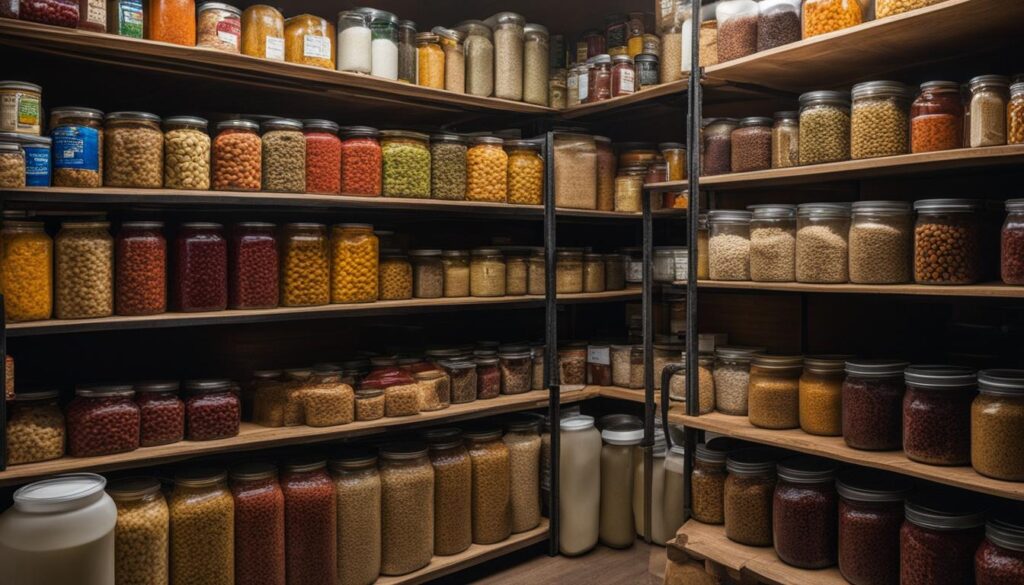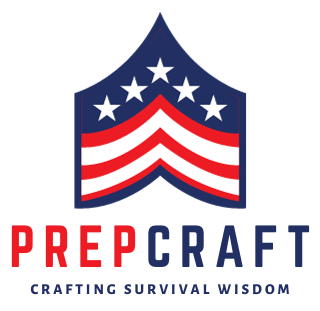
When it comes to emergency preparedness, many people believe that it requires a hefty budget. However, I’m here to tell you that prepping on a budget is not only possible but also highly practical. With the right mindset and determination, you can take steps towards being prepared for any emergency without breaking the bank.
As an advocate for personal responsibility, I firmly believe that relying on others may not always be feasible in an emergency. It’s crucial to take charge of your own preparedness and ensure the safety and well-being of yourself and your loved ones.
To start prepping on a budget, the first step is to determine the specific emergencies you are preparing for. This will help you allocate your resources more effectively. I recommend dividing your budget into two categories: “normal” expenses and “disruption” expenses. By doing so, you can prioritize your spending and ensure that you are adequately prepared for any potential disruptions.
The basics of prepping on a budget revolve around securing food, water, and shelter. Begin by focusing on acquiring a three-day supply of emergency food and water. Gradually build it up to two weeks, and eventually aim for a longer-term storage solution. For water storage, consider using a bathtub or investing in a water filter system that doesn’t require power. When it comes to food, prioritize shelf-stable items like canned goods and dry goods. Stretching your budget further is possible by taking advantage of food sales and cost-saving strategies.
Communication is key in any emergency situation. Let your loved ones know about your prepping efforts so that everyone is on the same page. Consider teaming up with like-minded individuals who share your goals and values. Joining or starting a prepper group can provide valuable support and resources for prepping on a budget.
Another essential aspect of preparedness is developing survival skills. Practice essential survival skills that are relevant to the emergencies you are preparing for. Learning how to cook without electricity or navigate dangerous situations can be invaluable in times of crisis. Continuously improve your skills by learning from reliable sources and tracking your progress.
Time and money management are crucial when prepping on a budget. Prioritize your needs and allocate time for learning and preparation. Cut back on time-consuming activities that do not contribute to your preparedness goals. Maximize your learning without spending additional money by utilizing online resources, books, and free classes.
Effective money management is essential for budget prepping. Create a budget specifically for prepping expenses and prioritize essential items. Look for ways to save money, such as shopping for sales, buying in bulk, and growing your own food. Consider side hustles or freelance work to earn extra income for your prepping needs. Repair and reuse items whenever possible to reduce costs.
Building a long-term food storage stockpile can be done on a budget. Instead of purchasing a year’s worth of emergency food at once, take a gradual approach. Look for discounts and sales on freeze-dried and dehydrated emergency food, which has a long shelf life. Consider purchasing food storage subscriptions that allow you to gradually build up your emergency food supply over time.
Key Takeaways:
- Prepping on a budget is possible with the right mindset and determination.
- Allocate a percentage of your budget towards “normal” expenses and “disruption” expenses.
- Start with the basics of food, water, and shelter and gradually build up your emergency supplies.
- Communicate with loved ones and consider teaming up with like-minded individuals.
- Practice essential survival skills and manage your time and money effectively.
Accepting Responsibility: The Key to Prepping on a Budget
Taking personal responsibility is essential when prepping on a budget. In the face of uncertainty, it’s crucial not to rely solely on others for assistance. You must be proactive and prepared for the scenario you are most likely to encounter. By accepting responsibility for your own well-being, you can navigate challenges more effectively and increase your chances of survival.
In emergency situations, immediate help may not be available. This is when self-reliance becomes paramount. By embracing a prepping mindset and taking the necessary steps to prepare, you can build the skills and resources needed to weather any storm.
Preparing for emergencies requires a shift in mindset. Instead of surrendering to fear or relying on external forces, you must cultivate a sense of self-reliance. Recognize that you have the power to take control of your own safety and well-being, and trust in your ability to overcome challenges.
“I’ve learned that the key to prepping on a budget is accepting responsibility. It’s empowering to know that I can rely on myself to navigate emergencies. By taking action and preparing proactively, I’m better equipped to protect myself and my loved ones.”
Understanding Responsibility in Prepping
Responsibility in prepping goes beyond simply stocking up on supplies and equipment. It involves understanding the potential risks and developing the skills necessary to mitigate them. By accepting responsibility, you commit to:
- Assessing the most likely emergencies you may face
- Creating a customized preparedness plan
- Acquiring the knowledge and skills needed to navigate those emergencies
- Building a network of like-minded individuals to share resources and support
- Continuously adapting and improving your preparedness strategy
Through acceptance of your prepping responsibilities, you can take proactive steps toward emergency preparedness.
Embracing the Prepping Mindset
The prepping mindset is about being prepared for the unexpected, understanding that emergencies can happen at any time. It involves recognizing that you are responsible for your own well-being and taking decisive action to protect yourself, your loved ones, and your community.
Being prepared means prioritizing your own safety and well-being so that you can respond effectively in times of crisis. It’s not about succumbing to fear but rather embracing the power of preparation.
By adopting the prepping mindset, you can change your perspective from one of vulnerability to one of empowerment. It motivates you to take charge of your own future and create a sense of security in an unpredictable world.
Determining How Much to Prep
When prepping on a budget, it’s crucial to determine how much to prep. Allocating your preparedness funds wisely ensures that you are adequately prepared for emergencies without straining your budget. Here are some key factors to consider when determining your preparedness needs and the percentage of your prepping budget to allocate:
1. Assess Your Potential Threats
Start by assessing the potential emergencies you are most likely to encounter. Consider the geographical location, climate, and other factors specific to your area. This will help you narrow down the types of emergencies you should prepare for.
2. Evaluate Likelihood and Severity
Next, evaluate the likelihood and severity of each potential threat. Some emergencies, such as earthquakes or hurricanes, may be more common in certain regions. Determine which emergencies pose the greatest risk to you and prioritize your preparedness efforts accordingly.
3. Set a Percentage for Normal Expenses
Allocate a certain percentage of your budget towards “normal” expenses. These include everyday items that contribute to your overall well-being, such as groceries, utilities, and healthcare. By setting aside a fixed percentage for these expenses, you ensure that your essential needs are met while still leaving room for preparedness.
4. Allocate Remaining Funds for Prepping
Once you’ve set aside funds for normal expenses, allocate the remainder of your budget towards “disruption” expenses related to preparedness. These include emergency supplies, equipment, and training. The exact percentage will depend on your personal circumstances and the prioritized emergencies you’ve identified.
5. Consider Income-Based Allocation
If you have a consistent income, consider setting aside a certain amount or percentage of your income specifically for preparedness. This approach ensures that you are continually building your supplies and investing in your long-term prepping goals.
| Category | Percentage of Prepping Budget |
|---|---|
| Normal Expenses | 60% |
| Disruption Expenses (Preparedness) | 40% |
6. Regularly Reassess and Adjust
Remember that determining how much to prep is an ongoing process. Regularly reassess your preparedness needs, especially if your circumstances change. Adjust your budget allocation accordingly to ensure that you remain prepared for the emergencies that pose the greatest risk to you.
By following these steps and allocating your prepping funds wisely, you can effectively determine how much to prep while maintaining a balanced budget. Remember, preparedness is an investment in your safety and peace of mind.
Starting with the Basics: Food, Water, and Shelter
As I begin prepping on a budget, I understand the importance of focusing on the basics: food, water, and shelter. These fundamental elements form the foundation of any emergency preparedness plan. By prioritizing these necessities, I can ensure that I am well-equipped to handle unexpected situations.
Emergency Food: A Three-Step Approach
When it comes to emergency food, I adopt a three-step approach to gradually build up my supplies. Starting with a three-day stockpile and working my way up to two weeks and beyond, I ensure that I have enough sustenance to sustain myself and my loved ones in case of an emergency. I prioritize shelf-stable items such as canned goods and dry goods, which have a longer shelf life and require minimal preparation.
Water Storage: Ensuring Hydration
Water is essential for survival, which is why I make it a priority to store an ample supply. I store water in my bathtub using water storage containers or invest in a water filter system that doesn’t require power. This way, I can have access to clean and safe drinking water, even in the event of a disruption in the water supply.
Shelter Preparedness: Get-Home Bag and Bug-Out Bag
Shelter preparedness is another crucial aspect of my prepping plan. I ensure that I have a get-home bag, which contains essential items to help me make my way back home during an emergency situation. Additionally, I have a bug-out bag ready, which is filled with supplies that I would need if I have to evacuate my home and seek temporary shelter elsewhere.
By starting with the basics of food, water, and shelter, I lay a solid foundation for my prepping journey. These necessities not only provide physical sustenance but also offer peace of mind in knowing that I am prepared for unexpected challenges.
As I progress in my prepping efforts, I can expand my supplies and focus on other essential items such as first aid kits, tools, and communication devices. By gradually building up my prepping arsenal, I can effectively manage my budget and ensure that I am prepared for a wide range of emergencies.
Communication and Teamwork in Prepping
Effective communication and teamwork are essential aspects of prepping on a budget. By engaging in open and honest conversations with your loved ones, you can ensure that everyone is on the same page when it comes to emergency preparedness. Discuss your prepping efforts and the specific scenarios you are preparing for, emphasizing the importance of being self-reliant in times of crisis.
While not everyone may fully embrace the idea of prepping, encourage your family and friends to participate in aspects they are comfortable with. This can range from learning basic survival skills to assisting with the organization and maintenance of emergency supplies. By involving others, you create a sense of shared responsibility and increase the overall effectiveness of your preparedness efforts.
Joining or starting a prepper group can provide a valuable support network and access to additional resources. Connecting with like-minded individuals who are committed to preparedness can offer a sense of community and the opportunity to learn from one another. The collective knowledge and skills within a prepper group can greatly enhance your preparedness capabilities.
Benefits of Joining a Prepper Group:
- Shared knowledge and expertise
- Access to diverse resources
- Collaborative problem-solving
- Exchange of ideas and strategies
- Accountability and motivation
Working together as a team can significantly increase your chances of survival and success in a long-term emergency situation. By pooling your individual skills and resources, you can overcome challenges more effectively and support one another during difficult times.
Remember, effective communication and teamwork are integral components of prepping on a budget. Engage your loved ones, consider joining a prepper group, and embrace the power of collaboration. By working together with like-minded individuals, you can enhance your preparedness efforts and build a stronger foundation for the future.

Practicing Survival Skills for Effective Preparedness
When it comes to being prepared for emergencies, practicing survival skills is essential. By honing your abilities, you can increase your chances of successfully navigating challenging situations. Whether it’s cooking without electricity or finding your way home in dangerous circumstances, developing the right skills can make a significant difference.
Start by identifying the survival skills that are most relevant to the emergencies you are preparing for. Consider the specific scenarios that are most likely to occur in your area and focus on acquiring the necessary skills to overcome them. By tailoring your training to the unique challenges you may face, you can be better equipped to handle any situation that arises.
It’s important to continuously improve your survival skills through practice and skill development. Seek out reliable sources of information and training materials that can provide you with the knowledge and techniques you need to succeed. Track your progress and evaluate what works and what doesn’t, making adjustments as necessary to refine your abilities.
- Attend local workshops or training sessions
- Participate in online courses or webinars
- Join local community groups or organizations focused on survival skills
- Read books and articles written by experts in the field
Remember, survival skills are not static – they require consistent practice and development. Take the time to regularly review and refresh your knowledge to ensure that your skills remain sharp. By dedicating yourself to ongoing improvement, you can boost your confidence and readiness for any emergency that may come your way.
Stay prepared and keep refining your survival skills!
“The more you sweat in peace, the less you bleed in war.” – Norman Schwarzkopf
Below is an example of a survival skills development plan:
| Skill | Learning Resources | Practice Activities | Progress Notes |
|---|---|---|---|
| Fire Starting |
|
|
Successfully started a fire using friction method |
| Navigation |
|
|
Able to navigate through unfamiliar terrain using compass |
| First Aid |
|
|
Performed CPR and basic wound management |
| Food foraging |
|
|
Successfully identified and consumed edible mushrooms |
Remember, consistent practice and skill development are essential in preparing yourself for emergencies. By dedicating the necessary time and effort to develop your survival skills, you can ensure that you are ready to face any challenges that come your way.
Managing Time for Effective Prepping
When it comes to prepping on a budget, managing your time effectively is essential. By allocating specific time for learning and preparation, you can make the most out of your resources. Here are some tips to help you manage your time effectively:
1. Prioritize Prepping Activities
In order to manage your time efficiently, it’s important to prioritize your prepping activities. Determine which tasks are most crucial and focus on those first. This will ensure that you are utilizing your time in the most impactful way possible.
2. Set Aside Learning Time
Allocate dedicated time for learning about different preparedness topics and acquiring new skills. This could involve reading books, attending free online classes, or taking advantage of educational resources. By setting aside time specifically for learning, you can continuously expand your knowledge without spending additional money.
3. Eliminate Time-Consuming Activities
Cut back on time-consuming activities that don’t contribute to your preparedness goals. This could include reducing excessive video gaming, limiting binge-watching sessions, or decreasing time spent on social media. By eliminating these distractions, you can free up valuable time to focus on prepping activities.
4. Focus on Relevant Skills
When managing your time for prepping, prioritize skills and actions that are relevant in both good times and bad. Identify the most essential survival skills that would be applicable to the emergencies you are preparing for. By honing these skills, you’ll be better equipped to handle any challenges that may arise.

5. Utilize Online Resources
Take advantage of the numerous online resources available for prepping. This includes websites, blogs, forums, and social media groups dedicated to emergency preparedness. These platforms can provide valuable insights, tips, and advice from experts and experienced preppers, allowing you to maximize your learning without spending extra money.
6. Stay Organized
Being organized is key to efficient time management. Create a schedule, to-do lists, or use digital tools to help you stay on track and focused. By staying organized, you can optimize your time and ensure that you are effectively using each moment towards your prepping goals.
By implementing effective time management strategies, you can make the most out of your prepping efforts without breaking the bank. Prioritize your activities, set aside learning time, eliminate time-consuming activities, focus on relevant skills, utilize online resources, and stay organized. By doing so, you’ll be well-prepared and ready to handle any emergencies that may come your way.
Managing Money Wisely for Budget Prepping
Effective money management plays a crucial role in prepping on a budget. By adopting smart financial strategies, you can make the most of your resources while still being prepared for emergencies. Here are some practical tips for managing your money wisely in the world of prepping:
Create a Budget for Prepping Expenses
To ensure that you allocate funds specifically for prepping, it’s important to create a budget. By setting aside a portion of your income for emergency preparedness, you can prioritize your prepping goals and track your progress. Start by determining how much you can comfortably afford to spend on prepping each month, and then stick to your budget.
Prioritize Essential Items
When working with a limited budget, it’s essential to prioritize your prepping purchases. Focus on acquiring the essential items first, such as food, water, medical supplies, and basic tools. These are the building blocks of any emergency preparedness plan and should be your initial focus.
Look for Ways to Save Money
In your prepping journey, finding ways to save money can make a significant difference. Consider shopping for sales and discounts on prepping supplies. Buying in bulk can also be cost-effective, allowing you to save money in the long run. Additionally, consider growing your own food and exploring DIY alternatives for certain supplies to further reduce costs.
Earn Extra Income for Prepping
If your budget allows, consider taking on side hustles or freelance work to earn extra income specifically for prepping purposes. This additional money can be allocated towards purchasing equipment or enhancing your prepping supplies. Look for opportunities that align with your skills and interests, as it can be a fulfilling way to generate income while working towards your preparedness goals.
Repair and Reuse
Before discarding items, take a moment to consider whether they can be repaired or repurposed. Repairing and reusing items whenever possible can help you save money and reduce waste. Get creative and explore DIY solutions to extend the lifespan of your prepping supplies.
Trim Unnecessary Expenses
To free up more funds for prepping, evaluate your current expenses and identify areas where you can cut back. Assess your subscription services, such as multiple streaming platforms or costly smartphone plans, and determine if any can be reduced or eliminated. By trimming unnecessary expenses, you can redirect those funds towards your prepping efforts.
Managing your money wisely is an essential aspect of prepping on a budget. By creating a budget, prioritizing essential items, looking for money-saving opportunities, earning extra income, repairing and reusing, and trimming unnecessary expenses, you can maximize your resources and effectively prepare for emergencies.
Building a Long-Term Food Storage Stockpile
When it comes to prepping on a budget, one crucial aspect is building a long-term food storage stockpile. By gradually accumulating essential supplies, you can ensure preparedness without straining your finances. Instead of purchasing a year’s worth of emergency food in one go, consider a strategic and cost-effective approach.
One of the best ways to save money while building your food stockpile is by taking advantage of discounts and sales on freeze-dried and dehydrated emergency food. These products have a long shelf life and can be stored for an extended period. Keep an eye out for special offers or promotions from reputable brands that offer budget-friendly options.
A practical option for gradually building your food supply is to consider food storage subscriptions. These allow you to receive regular shipments of emergency food, gradually increasing your stockpile over time. By spreading out your purchases and taking advantage of convenient payment plans, you can make your budget go further.

Here is an example table comparing different types of budget-friendly long-term food storage options:
| Food Storage Option | Features | Price |
|---|---|---|
| Freeze-dried meals | Lightweight and convenient. Long shelf life. | $ |
| Dehydrated food | Relatively inexpensive. Variety of meal options. | $ |
| Food storage subscriptions | Regular deliveries. Gradual stockpiling. Convenient payment plans. | $$ |
Remember to consider your specific dietary needs and preferences when selecting food storage options. It’s also advisable to regularly rotate and consume the items in your stockpile to ensure freshness and maintain a well-rounded emergency food supply.
“Building a long-term food storage stockpile is an important aspect of preparedness. By taking a gradual approach and being savvy with your purchases, you can effectively build up your food supply while sticking to a budget.”
By utilizing these strategies, you can gradually establish a well-stocked food storage supply without breaking the bank. It’s important to be strategic, patient, and mindful of sales and discounts. With careful planning and budgeting, you can achieve long-term food security and peace of mind.
Prepping on a Budget: Achieving Preparedness with Resourcefulness
Prepping on a budget is not only possible, but it is achievable by anyone who is willing to put in the effort. It all starts with proper planning, prioritization, and cost-saving strategies. Taking personal responsibility is a crucial first step. By accepting responsibility for your preparedness, you can ensure that you’re not relying on others in times of crisis.
When prepping on a budget, focus on the essentials – food, water, and shelter. These are the building blocks of survival. Communicate with your loved ones about your prepping efforts, as their support and involvement can strengthen your preparedness efforts. It’s also worthwhile to connect with like-minded individuals to share knowledge and resources.
Practicing essential survival skills is another key aspect of prepping on a budget. By honing your skills, you become better equipped to handle emergencies. Effective time and money management are also essential. Prioritize your needs, maximize your learning through free resources, and consider additional income opportunities to support your prepping endeavors.
As you gradually build up your emergency supplies, don’t overlook the importance of long-term food storage. Look for budget-friendly options such as freeze-dried and dehydrated foods, and take advantage of discounts and payment plans to make your budget go further. With resourcefulness and a commitment to preparedness, prepping on a budget is not only feasible but within reach for anyone willing to put in the effort.
FAQ
Can I prep on a budget?
Yes, prepping on a budget is possible with the right mindset and determination. It requires careful planning, prioritization, and cost-saving strategies.
Why is personal responsibility important in prepping on a budget?
Taking personal responsibility is crucial in prepping on a budget. Relying on others may not be feasible in an emergency, so it’s important to be self-reliant and prepared to handle challenges on your own.
How much should I prep?
Determine the specific emergencies you are preparing for and allocate a certain percentage of your budget towards “normal” expenses and the remainder towards “disruption” expenses. The specific percentage will depend on the likelihood and severity of the emergencies.
What are the basics of prepping on a budget?
Start with the basics of food, water, and shelter. Begin by aiming for three days’ worth of emergency food and water in storage, and gradually increase this to two weeks or longer. Prioritize shelf-stable items and make use of sales to stretch your budget.
How can I communicate and collaborate with others in prepping?
Communicate with your loved ones about your prepping efforts and engage them in aspects they are willing to accept. Consider partnering with like-minded individuals and joining or starting a prepper group, as teamwork is crucial in long-term preparedness.
What survival skills should I practice for effective preparedness?
Identify the skills most relevant to the emergencies you are preparing for, such as cooking without electricity or walking home in dangerous situations. Continuously improve your skills by learning from reliable sources and practicing regularly.
How can I manage my time effectively for prepping?
Allocate dedicated time for learning about preparedness topics and acquiring new skills. Cut back on time-consuming activities that don’t contribute to your goals. Utilize online resources and free classes to maximize learning without spending additional money.
How can I manage my money wisely for prepping?
Create a budget and allocate funds specifically for prepping expenses. Prioritize essential items, look for ways to save money like shopping for sales and buying in bulk, and consider earning extra income through side hustles or freelance work.
How can I build a long-term food storage stockpile on a budget?
Rather than purchasing a year’s worth of emergency food at once, take a gradual approach. Look for discounts and sales on freeze-dried and dehydrated emergency food, consider food storage subscriptions, and take advantage of convenient payment plans and periodic discounts.


